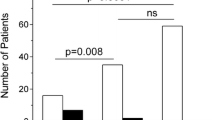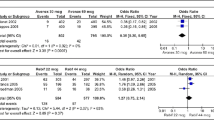Abstract.
We analysed the kinetics and clinical impact of binding antibodies (BAbs) and neutralizing antibodies (NAbs) to three interferon beta (IFNβ) products in patients with relapsing-remitting MS (RRMS). Patients with RRMS received IFNβ-1b 8 MIU subcutaneously (SC) every other day, intramuscular (IM) IFNβ-1a 30 mcg once weekly, or SC IFNβ-1a 22 mcg three times weekly for up to 4 years. The changes of BAbs and IFNβ were measured using enzyme-linked immunosorbent assay (ELISA), and positive BAb samples were then analysed for neutralizing activity using an antiviral cytopathic effect assay. Patients were considered BAb+ if they had a positive sample with an optical density (OD) > mean + 3SD of the OD of the control sample; high BAb titers were defined as > 1:500. Patients were considered NAb+ if they had titers ≥ 20 LU/mL, with high NAb titers defined as > 1:100. The impact of BAbs and NAbs on relapses and Expanded Disability Status Scale (EDSS) score also was evaluated. Thirty patients were enrolled in each treatment group. Over the course of the study, 83% of patients developed BAbs to IFNβ-1b, 13% to IM IFNβ-1a, and 47 % to SC IFNβ-1a. Forty percent of patients developed NAbs to IFNβ-1b, 6.7% to IM IFNβ-1a, and 26.7 % to SC IFNβ-1a. Of 22 NAb+ patients, 10 patients (45.5%) demonstrated high titers of both NAbs and BAbs (20% IFNβ-1b, 3.3% IM IFNβ-1a, 10% SC IFNβ-1a). The relapse rate significantly increased after the appearance of high NAb titers (p = 0.03); however, an even higher significance level (p < 0.001) was observed in patients with high titers of both NAbs and BAbs. In 10 patients with high titers of both NAbs and BAbs, an increase in mean EDSS score from 2.2 ± 0.8 at baseline to 3.6 ± 1.2 at year 2 (p < 0.01) was observed. NAb-negative patients showed no significant change in EDSS score at year 2. These findings demonstrate that high titers of both BAbs and NAbs reduce the clinical efficacy of IFNβ in patients with RRMS, which is important for the long-term efficacy of these drugs.
Similar content being viewed by others
Author information
Authors and Affiliations
Corresponding author
Additional information
This study was supported by a grant from Veneto Region.
Rights and permissions
About this article
Cite this article
Perini, P., Calabrese, M., Biasi, G. et al. The clinical impact of interferon beta antibodies in relapsing-remitting MS. J Neurol 251, 305–309 (2004). https://doi.org/10.1007/s00415-004-0312-8
Received:
Revised:
Accepted:
Issue Date:
DOI: https://doi.org/10.1007/s00415-004-0312-8




